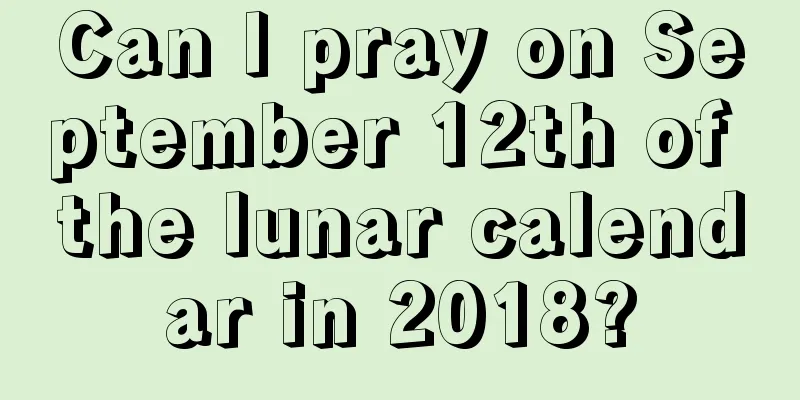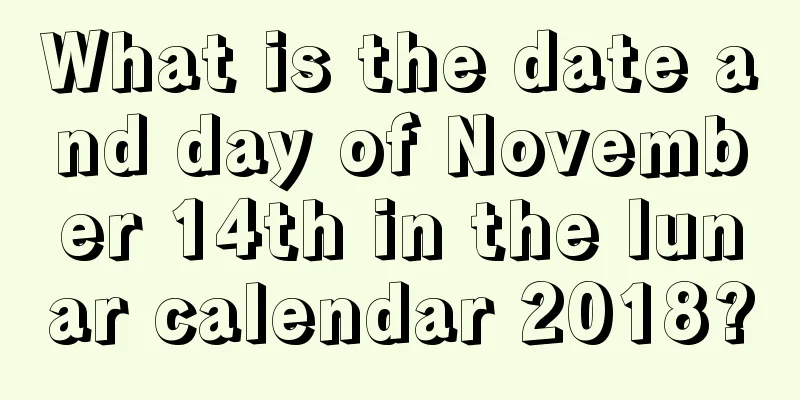Which month of the lunar calendar is the twelfth lunar month? What is the saying

There are twelve months in a year, numbered from 1 to 12. So, which month is the twelfth lunar month that we often talk about? Is there any explanation for this? The twelfth month of the lunar calendar is the twelfth month, commonly known as the end of the year, and is also known as Ladong, Candong, Qiongdong, Layue, and Bingyue. Let’s go to Shuimoxiansheng.com to check out the relevant content for the twelfth month of the lunar calendar in 2018.Which month of the lunar calendar is the twelfth lunar month?The twelfth month of the lunar calendar is the twelfth month. Why is it called the twelfth lunar month? The twelfth month of the lunar calendar is called "La Yue", which was also called "La Yue" in ancient times. This title has little to do with the natural seasons, but is mainly related to the annual sacrifices. The so-called "La" was originally the name of the sacrifice at the end of the year. Han Ying Shao's "Customs and Meanings" said, "In the Xia Dynasty, it was called Jiaping; in the Yin Dynasty, it was called Qingsi; in the Zhou Dynasty, it was called Da La; and in the Han Dynasty, it was changed to La. La means hunting, which refers to hunting animals to sacrifice to the ancestors." Or it is said, "La means connection, the connection between the old and the new, so a grand sacrifice is held to reward the merits." What is said here, whether it is offering animals to ancestors after hunting, or worshiping gods due to the connection between the old and the new, sacrificial activities are required, so the twelfth lunar month is the "month of sacrifice."What are the customs of the twelfth lunar month?1. Drink Laba Porridge In the Ming Dynasty, a few days before Laba, red dates would be pounded and soaked in water. On the morning of the eighth day, rice, ginkgo, walnut kernels, chestnuts, water chestnuts, etc. would be added to cook porridge, which was called "Laba Porridge". The porridge starts to be prepared on the seventh night and is ready at daybreak. It is offered to ancestors or friends and should not be eaten after noon. The Han people send each other Laba porridge and "Jicai" at the same time. This was pickled at the beginning of winter. Every family pickles "Laba Garlic" on this day, peels the garlic and soaks it in vinegar, and eats it with dumplings on New Year's Eve. The vinegar is fragrant and the garlic is green, which is unique. 2. The Kitchen God goes to heaven on the 23rd day of the twelfth lunar month, also known as the "Little New Year", which is the day when the Han people worship the Kitchen God. The Han people have a custom that "men do not worship the moon, and women do not worship the Kitchen God", so worshiping the Kitchen God is limited to men. Among the folk gods of the Han nationality in China, the Kitchen God is considered to be very old. The Kitchen God had already become a great god revered by the Han people in the Xia Dynasty. Since the Zhou Dynasty, the imperial palace has included the worship of the Kitchen God in its sacrificial ceremonies, established rules for the worship of the Kitchen God throughout the country, and it has become a fixed ritual. In the north, there is a saying that "On the 23rd day of the twelfth lunar month, the Kitchen God goes to heaven." After the whole family offers sacrifices, they remind the Kitchen God: "After he goes to heaven, say more good things and less bad things." 3. Worshiping ancestors, putting up door gods, setting off firecrackers, giving lucky money, having a new year's eve dinner, and sending off the God of Wealth . The 30th day of the twelfth lunar month is also called New Year's Eve, which is one of the traditional festivals of the Han nationality. It is held on the last night of the twelfth lunar month every year, and is connected to the Spring Festival (the first day of the first lunar month). The main Han folk activities on this day include ancestor worship, posting door gods, setting off firecrackers, giving out New Year's money, eating New Year's Eve dinner, and sending off the God of Wealth. The word "chu" in "Chuxi" means "to go, to change, to alternate". Chuxi means "the end of the month and the year". People have to get rid of the old and welcome the new. It means that the old year is over and the new year will come. It is the last night of the lunar calendar. |
<<: What constellation is the tenth day of the twelfth lunar month in 2018?
>>: What date is November 27th in the lunar calendar 2018? What day is it?
Recommend
Names for people born on May 1, 2018 whose five elements lack wood
As the saying goes "One is fate, two is luck,...
The Feng Shui of ancient buildings has secrets that can bring both health and wealth!
Introduction: We all know that Feng Shui has a lon...
What is the temperature during the Rain Water solar term? What does snow during the Rain Water solar term mean?
The Rain Water solar term is the second solar term...
Are babies born on Dragon Boat Festival lucky? What about fortune and destiny?
Introduction: There are 365 days in a year, and ne...
What is the fate of a boy born in leap April? Analysis of the horoscope from the first to the fifteenth day of leap April!
Introduction: Leap April is a special month, and m...
What are the lunar calendar do’s and don’ts for the sixth day of the twelfth lunar month in 2020?
The cold winter brings us to the New Year, and De...
Is it a good day to get married on the second day of the ninth lunar month in 2017? Is it a good day to get engaged?
The falling leaves indicate the beginning of autu...
Is it a good idea to hold a memorial ceremony for the Ghost Festival today in 2019? Can I visit the graves and worship my ancestors in advance on the Ghost Festival?
The seventh day of the seventh month of the lunar ...
Is May 24th of the lunar calendar in 2022 a good day to propose? Is it an auspicious day?
The fifth month of the lunar calendar, also known ...
What month is the sixth lunar month in 2019? What is the fate of women born in the sixth lunar month?
The weather in the sixth lunar month is hot. What ...
Feng Shui tips to help you stop being single in 2017!
Introduction: 2017 has arrived, and our tradition...
Is it not appropriate to pay New Year's greetings on the third day of the first lunar month in 2021? Is it not appropriate to travel on the third day of the first lunar month in 2021?
Introduction: The third day of the first lunar mon...
Is it a good idea to raise the beam the day after the Lantern Festival in 2021? What zodiac sign is in conflict with February 27?
Introduction: Regarding the work of raising the be...
Is it a good idea to pick up a new car on July 7, 2018?
The Fortune Teller website has carefully compiled...
Is the eleventh day of the first lunar month in 2018 a good year? What is the lunar calendar?
Introduction: People have the habit of choosing au...









